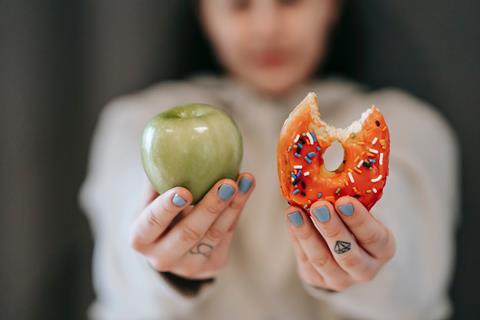When the world brands some food “good” and some food “bad” and we’re bombarded with messages about slimming down with fad diets, it’s hard for us - or our children - to know how to navigate it. Here Dr Kate Middleton gives three simple thoughts that can help us have a truly healthy attitude towards eating.

“Mum! You can’t put butter on my sandwich! Its a bad food!!” This has become a common debate in my household over recent weeks, after my son’s class spent some time thinking about healthy eating. But this makes the psychologist and church leader in me want to scream, never mind the Mum! Because it misses MANY important points about what healthy eating really is.
The thing is - my son isn’t alone in struggling with some of the messages he is hearing about food and “healthy” eating. Recent research suggests one in four primary school aged children are already on diets, or trying to lose weight, and many of these are within a healthy weight range.
So, here are my three thoughts on what REALLY matters, as we’d eat with this tricky topic:
To eat healthily, we need to be relaxed
An anxious over-focus on food is rarely healthy. Even if you do need to make some changes to your or your family’s diet, if you are overthinking everything you eat, it is likely to make it a source of stress. The stricter the diet, or more restrictive the practice the more unhelpful it is likely to be in the long-term.
Watch out for things that trigger negative emotions around food, and try not to get into cycles of guilt or anxiety. Instead of focusing on what you SHOULDN’T do, think about positives. Can you replace snacks or meals with super healthy alternatives? Can you aim to fit IN your five portions of fruit and veg a day instead of thinking about what you cut OUT? Are there simple swaps you can make in some areas, that mean you can be relaxed in others?
No food is ‘bad’ - its just not that simple
We need to be real. Some need to be eating more sparingly, with wisdom, or as more occasional treats - but that doesn’t mean they have no value, or solely negative value. Label something bad and you set up a psychological power game that makes you crave it even more, and triggers difficult emotions like guilt and anxiety.
So watch out in particular for very strict “black and white” restrictive rules or eating philosophies. And be careful if you know you are under pressure or stressed - when your mind is overloaded its more prone to slipping into very black and white thinking - which could leave you beating yourself up for having eaten something when in the scheme of things it’s ok.
Think about balance - and where those delicious but not everyday things might fit - don’t just feel like they’re forbidden. And of course - in these financially pressed times, we all have to be realistic about what we can and can’t afford. Don’t feel bad if your budget doesnt stretch to the amazing fresh berry rich smoothies or elaborate salads you see on social media. You can eat healthily without blowing the budget. So don’t worry if your meals look and feel a bit more “real life” than “real fancy”!
We need to be blessed
This is the MOST important thing to remember, and it so often gets lost in messages about healthy eating. Food is about so much more than nutritional nourishment. It is a blessing, a source of joy, often creating a focus or space where we meet with people we love, relax and connect.
In the original Genesis blueprint food was given as part of God’s desire for flourishing. Only once the negatives force of sin had entered creation did it become connected with less positive things. Our love and celebration of food is part of our creation in God’s image - food is there for us to ENJOY and it is one of life’s good things. In fact food (and even feasting!) rituals are part of the healthy rhythm that God has always advised for his people. Ecclesiastes 9:7 captures this, encouraging us to eat with JOY and happiness. And in 1 Corinthians 10:31, it is eating and drinking that comes to mind when Paul is thinking about things we do which glorify God! But so often our world takes gifts God offers us and makes them sources of distress or difficulty. Don’t let this one be stolen from you. Think about how food brings you joy and what it looks like to keep that, even as you eat healthily.
And there’s one final nugget of wisdom the Bible has for us around food. It IS good, but it shouldn’t be our main source of comfort and emotional sustenance. Isaiah 55 records a prophetic cry from God to His people to nourish themselves not just with good food, but with the life-giving “food” found in his words, his love, his promises. So often food becomes problematic when it has become mixed with other things; difficult emotions, feelings about ourselves, trauma or tough stuff.
If you know that’s part of your mix, don’t just reach for another diet. It won’t solve the problem. Instead, think about where you can find some support to look deeper, into what is going on underneath your eating. Make some time - whether that is with a good friend, time alone in prayer or ponder, or the first steps to find a therapist or professional who can help.

I’m a mental health specialist and a mental illness diagnosis shouldn’t define us - only God can do that
I’m a Christian and a doctor and this is how your periods affect your mental health, plus how to manage it the godly way
‘Suicidal thoughts are nothing to be ashamed of, but they do need to be taken seriously’



































No comments yet